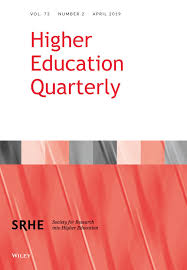Marek Kwiek has just published a paper in “Higher Education Quarterly” – link here.
An Invited Article is “Social Stratification in Higher Education: What it means at the micro‐level of the individual academic scientist“, see PDF here.
Abstract
The academic profession is internally divided as never before. This cross-national comparative analysis of stratification in higher education is based on a sample of European academic scientists (N = 8,466) from universities in 11 countries. The analysis identifies three types of stratification: ‘academic performance stratification’, ‘academic salary stratification’, and ‘international research stratification’. This emergent stratification of the global scientific community is predominantly research-based, and internationalization in research is at its center; prestige-driven, internationally competitive, and central to academic recognition systems, research is the single most stratifying factor in higher education at the level of the individual scientist. These stratification processes pull the various segments of the academic profession in different directions. The study analyses highly productive academics (‘research top performers’), highly paid academics (‘academic top earners’), and highly internationalized academics (research ‘internationalists’) and explores the implications for individual scientists.
Abstrait: Stratification sociale dans l’enseignement supérieur: ce que cela signifie au niveau micro d’un chercheur universitaire individuel
La profession académique est divisée en interne comme jamais auparavant. Cette analyse comparative transnationale de la stratification dans l’enseignement supérieur repose sur un échantillon de scientifiques universitaires européens (N = 8 466) issus d’universités de 11 pays. L’analyse identifie trois types de stratification: la «stratification de la performance académique», la «stratification de la rémunération académique» et la «stratification de la recherche internationale». Cette stratification émergente de la communauté scientifique mondiale est principalement basée sur la recherche et l’internationalisation de la recherche est au centre de celle-ci; axée sur le prestige, compétitive sur le plan international et au cœur des systèmes de reconnaissance académique, la recherche est le facteur le plus déterminant dans l’enseignement supérieur au niveau de chaque chercheur. Ces processus de stratification entraînent les différents segments de la profession universitaire dans différentes directions. L’étude analyse les universitaires hautement productifs («chercheurs les plus performants»), les universitaires bien rémunérés («les plus généreux») et les universitaires hautement internationalisés («chercheurs internationalistes») et explore les implications pour les scientifiques.

“Higher Education Quarterly” is published by The Society for Research into Higher Education, established in 1965. It aims to improve the quality of higher education through the encouragement of debate and publication on issue of policy, on the organisation and management of higher education institutions, and on the curriculum, teaching and learning methods.
The society’s income is derived from subscriptions, sales of its books and journals, conference fees and grants. It receives no subsidies, and is wholly independent. Its individual members include teachers, researchers, managers and students. Its corporate members are institutions of higher education, research institutes, professional, industrial and governmental bodies. The Society’s membership is international with members in every continent and it regards its international work as amongst its most important activities.
Under the imprint SRHE & Open University Press, the Society is a specialist publisher of research, having some 60 titles in print. The Editorial Board of the Society’s Imprint seeks authoritative research or study in the relevant areas. It offers a highly recognisable format in both hard- and paper-back and the world-wide reputation of the Open University Press.


